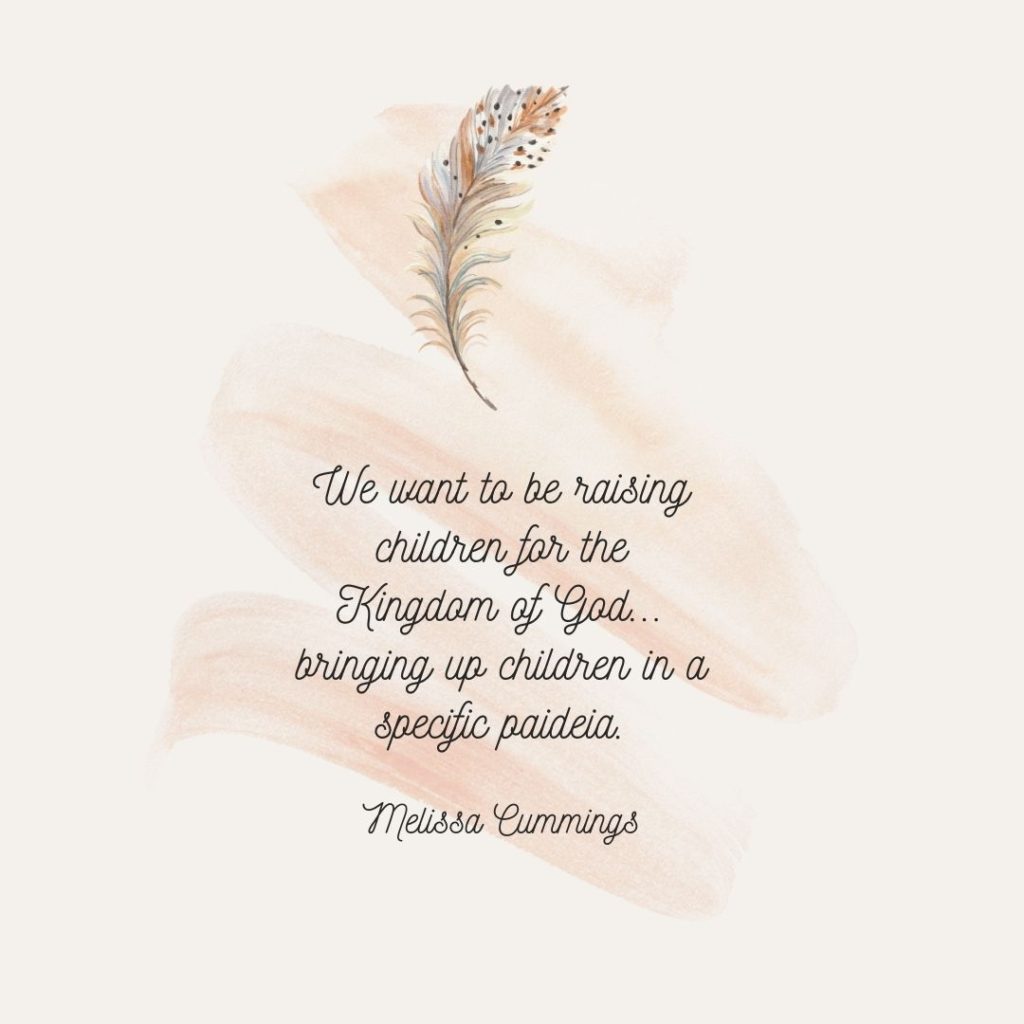Paideia Conversations, Ep. 1

In Episode 1 of Paideia Conversations, I was joined by my cohost Jenn Discher from sister community Paideia Southeast. In this inaugural conversation, we simply opened with basic questions: what is paideia? How do we spell it, pronounce it, define it? How do we pursue godly paideia, in light of Ephesians 6:4?
Then we shared some snippets and thoughts from Douglas Wilson’s essay The Paideia of God as an opening springboard.

Repentance, worship, prayer, Bible reading, joy, forgiveness! These are the foundation upon which we are building Christian culture.
Resources mentioned in this episode:
The Paideia of God by Douglas Wilson, title essay
The Case for Classical Christian Education by Douglas Wilson, chapter 13
Repent, Rejoice, Repeat ~ Mystie Winckler, Simply Convivial
Ephesians 6:4 & 2 Timothy 3:14-17

Transcript for Episode 1
Melissa: joining me today from Paideia Southeast is my friend Jenn Discher, and we invite you into this conversation today as we continue to practice, pursue, and implement paideia. Thanks for joining me, Jenn!
Jenn: yes, I’m so happy to be here. Thank you!
Melissa: so, today: episode number one! We are talking about, what IS paideia? And WHO is this for? And, specifically for our springboard, an essay that we discussed together this summer called The Paideia of God by Douglas Wilson. It’s always nice to have something to start with and discuss, and jump off from there rather than trying to come up with our own great ideas, right?
Jenn: yes, absolutely.
Melissa: talk about what blessings we can gain from that, and what we need to chew and spit. So paideia. What is this? What is this word? It’s so foreign to us, right? It’s not an English word. We don’t know how to spell it, we don’t know how to pronounce it…
Jenn: we don’t! We don’t know how to spell it! [laughter]
Melissa: So yeah, with Paideia Northwest and Paideia Southeast, it’s like, we have to know how to spell that, we have to know how to pronounce it, and we probably should have at least something of an understanding of what it means. Right? What is our vision with these communities and in encouraging moms to pursue this word, this paideia, for their families? So paideia: P-A-I-D-E-I-A, right? So paid. Paid… paideia… It starts with paid! That at least helps a little bit, right?
Jenn: that’s good. Yep, that’s good!
Melissa: and then for pronouncing it, my friend Mystie Winckler from the Scholé Sisters said, well we’re gonna pronounce it “pie” as in delicious pie, “day” as in the opposite of night, and we’re gonna throw in “uh” just for good measure. So pie-day-uh. And that’s always been really helpful.
Jenn: that’s great!
Melissa: so there you go. That’s how you spell it, that’s how we’ll pronounce it. And now we get to the fun part: what is this? First of all, Jenn, what is your background with the idea of paideia? Is this a brand new word to you or when did you first hear about this word or this idea?
Jenn: I would say maybe about five years ago, I’m estimating. So, I mean, it’s in Ephesians 6:4 so I was always familiar with that verse, like, “fathers, raise your children in the nurture, instruction, or the discipline, or the training” however it’s translated… but I don’t think I became aware that that nurture or that training was actually the Greek word paideia and really the fullness of that word until the last few years.
Melissa: right. Yeah. I know I’d heard the word when I was a child, or at least a teenager. But it’s definitely since motherhood and since homeschooling in the last thirteen years for me… it’s really… I’ve had to chew on it and flesh it out. I think understanding the height, the breadth, the depth of it is just – we could have endless conversations about it!
Jenn: yes, totally!
Melissa: so I think that’s why we wanted to share these conversations with others, right? Because we’ve been chatting about this idea for a few months and with some of our other friends, we’ve been chatting about it off and on for months, or maybe a couple years for some of us, right? And wanting to share that conversation with others. So yes, it’s a Greek word, right? We got it from ancient Greek culture where their vision was to raise fantastic little Greeks, right? And who are we trying to raise? We are trying to raise citizens of heaven. They might happen to be a citizen of a, you know, a specific nation on earth, but ultimately our citizenship is in heaven. So we want to be raising children for the kingdom of God. So what are we trying to raise? Little Christians! Not little Americans or little Greeks, we want to be bringing up children in this specific paideia. So what kind of words come to mind when you think of paideia? I know for me originally it was, like you said, nurture, instruction, discipline, education, formation – are there other words that pop into your mind?
Jenn: training, enculturation – like enculturating, culture of the Lord.
Melissa: yeah, I think that’s the big one, right, that ties them all together: the enculturation. It’s that entire person. It’s not just, if you could separate the spirit and the physical, or the intellectual: it’s not just the “Christian” part, it’s not just making sure they read their Bible and training them in catechism, and sitting at church on Sundays…
Jenn: right.
Melissa: it is that, it’s at least that! It’s also not just, you know, “school.” It’s not just the books we read or the books we listen to. It’s ALL of it. And I think that’s where, for me, I find that to be really refreshing and also very heavy. Right? It’s a lot! It’s everything. Nothing is outside the realm of this paideia. And so if we are to be pursuing a particular paideia, the paideia of the Lord as Paul told us in Ephesians, how do we go about that and what’s that supposed to look like?
So one of the places that we’ve discussed together is… Douglas Wilson has a bunch of great things about Christian education and classical education and parenting… a Paideia of God essay. I wanted to read just something out of there, a couple little excerpts.
He says, “much more is involved in this requirement [that of raising our children in the paideia of the Lord] than simply establishing the scope and sequence of a formal Christian education. Formal education is essential to the process of paideia, of course, but the boundaries of paideia are much wider than the boundaries of what we understand as education. Far more is involved in this also than taking the kids to church or having an occasional time of devotions in the home, as important as such things are. And, more to the point, far more is involved than simply providing the kids with a Christian curriculum 8-3.
So the word paideia goes far beyond what we call formal education. In the ancient world, the paideia was all-encompassing and involves nothing less than the enculturation of the future citizen. Paideia for us then would include the books on the best seller lists, the major newspapers, the popular sitcoms and networks, the songs on the top forty lists, the motion pictures seen by everyone, the architectural layout of most suburban homes, and out at the periphery the fact that all our garden hoses are green.”
[Laughter]
Melissa: That’s an illustration that I think is just intriguing. How far reaching this simple term of paideia is supposed to go. So, to sum it up, Douglas Wilson says, “paideia is not just bounded education, it is enculturation. Every aspect of enculturation.” I love that! That while the paideia is not limited to formal education or limited to going to church on Sunday or family devotions, we certainly see that those things are at the heart of paideia. So we ought to do nothing less than that, right? But how much more could we do?
So um, yeah, I think it would be great if you wanted to pull out The Case for Classical Christian Education by Douglas Wilson. And chapter thirteen is one of his treatises, you could say, on the paideia of God. And we’ve discussed this one at length actually this summer, and just sort of pondered a lot of the principles and discussed some of the methods – but really maximizing on those principles. What would you say stands out to you, Jenn?
Jenn: I think, so I’m looking at the book; in that first page, he actually has that quote from the other book, Melissa, that you just read from. But he says that it describes an entire way of life, and I think that also sums it up well. I recently read a quote from a classical education website, I think it’s called The Classical Difference, and they put it along these lines, the paideia: “paideia describes what we actually love, what we actually believe, the truth we actually believe, and what we assume about the nature of the world.” And that’s huge, right? And it also speaks to the fact that it’s not, it’s not just, I mean, in Ephesians, Paul’s saying, do this, raise your kids in the paideia of the Lord; but really everybody, regardless of worldview, has a particular paideia. Everybody has values and beliefs and presuppositions and loves. This is gonna happen to all of us. We’re all going to go through life developing a particular paideia. It’s just a matter of what they are, like what these particular values, beliefs, loves are, and how we get them. And the how can be intentional or it can just be something that happens to us.
Melissa: mmhm. Yeah. Cultural values is something, I think, you know we all are raised in a culture, those of us who are parents now were raised actually in a different culture probably than what we’re raising our children in, whether that’s simply because of the passage of time or a change in worldview – not all of us were raised with a Christian worldview but maybe that’s the worldview that we now have to raise our children in. I think that’s huge. Right? Also, our world is constantly changing and culture is developing and being reshaped continually out there as well. So even if we feel like, oh our home culture is, not static but that my worldview isn’t changing that much, it is changing outside too. And those elements do get in. So how do we proactively and reactively pursue a particular paideia within our homes? So yeah. The entire way of life. That’s so good.
I think what’s interesting is, you know, you said, what are our loves? And how what we think we love, what we say we love, may or may not be expressed in our life. So how have you experienced living out paideia in your home? Has it been different in your plan versus in its actual production? What have you found to be strengths and weaknesses with that?
Jenn: I think that there’s, I mean, there’s just always gonna be inconsistencies. Right? Because we’re sinners, and we’re never, like we’re shooting for these ideals and at the same time, I’m still like fleshing, thinking through, what even are these ideals? What does it, what does a joyful, robust Christian culture look like in a home? It’s not something I grew up with. So at the same time that I’m sort of coming to this understanding, and trying to by God’s grace, alongside my husband, flesh this out in my home, I’m also failing to execute this well. And so, I mean, that’s just repentance, right? That’s just repentance, putting that off. Getting before the Lord about that, and receiving forgiveness, you know, making it right with whoever was present who I need to make it right with and moving on. So there’s that element, where there’s that, you know, there’s those inconsistencies that you’re aware of and convicted of and you go to make right. But then I think there’s also, sometimes you’re not totally aware of the inconsistencies, and you might say that you value certain things, but that what’s actually coming out of your mouth – even if it’s not necessarily sinful, it’s just like, oh, you might not even realize that that’s not what I want. I don’t know, you almost have to take that step back sometimes, and sometimes you’re made aware of that. And sometimes it takes a while to realize that.
Melissa: yeah, absolutely. I think it, for me, definitely, sin nature is what pops into my head when I think, oh I have these plans or this set of – like you said, ideals – and it’s my sin nature compounded by the sin nature of my children that just makes it difficult to actually seek the Lord in all of these things. In every aspect of our home culture and our educational culture that we pursue. Now, you and I both homeschool, and so that also gives a particular opportunity for pursuing paideia in a specific way. So one thing that I think is important to note today is that, like you said before, paideia is for everybody. It’s for me as a mom as well as for my children, it’s for me as a homeschooler and you as a homeschooler, but it’s also for our sisters who are raising kids for Christ who are not homeschooling. Right? We mentioned before that idea of principles over methods, and so as we discuss paideia in the future, we’re going to be talking somewhat about homeschooling because you and I are both in that particular trench right now, but also including conversations about pursuing paideia outside of a homeschool setting. Hopefully bringing some friends into that conversation who have that experience as well.
Douglas Wilson, in this essay The Paideia of God, on page 109 says, “the Apostle Paul commanded Ephesian fathers to provide their children with a paideia of the Lord. This is not a command limited to enrollment in a Christian school. What Paul is requiring is nothing less than the establishment of a Christian civilization or culture. Paideia means enculturation and you cannot have Christian enculturation without a Christian culture.” And then on 111, this follows that, “Paul says the Scriptures are profitable as the foundation of our Christian paideia.” So that would be referencing back to 2 Timothy 3:14-16, all Scripture is given by inspiration of God and is profitable for doctrine, for reproof, for correction, for instruction in righteousness. And what is paideia if not instruction in righteousness? So that’s a beautiful place for us to start on these conversations. And Scripture, right, Scripture in our conversations, in our books, the artwork on our walls, coming out of our mouths when we are praying, when we’re frustrated, when we’re joyful – all of these things, these are opportunities to use what we say we love. Right? And Scripture ought to be at the foundation of that, regardless of your educational method or your own educational background or your own spiritual background. Right? I’ve been in a Christian home for 37 years, but that doesn’t mean that I am furthering along the road of pursuing paideia than someone who’s been in a Christian home for 7 years. So this is for all of us, and I think that’s what is so good about having these opportunities to discuss these ideals and these principles.
Now, we mentioned sin nature as one of our… well, as THE main hiccup in the pursuit of paideia. What would you say is one of your absolutes? What is a part of paideia that is just – if you had to just name one thing that is a core of paideia in your home – what would you say?
Jenn: well, I mean, the first thing that came to mind honestly was repentance. Because, I mean, I would say worship too, I would say prayer, I would say Bible reading – all of that. But the thing that feels most tangible, my most like felt need on a daily basis, is repentance… I love Mystie Winckler’s “repent, rejoice, repeat.” It’s not like a glum repentance. You’re rejoicing! You’re rejoicing in the Lord. The joy of the Lord is our strength. And we want to be quick forgivers, we want to be quick to ask for forgiveness, we want to be quick to extend forgiveness, and then we move on. And then it’s forgiven, it’s dealt with, it’s removed as far as the east is from the west, we start over, His mercies are new every day. And that is just such a truth to hold onto.
Melissa: amen!
Jenn: I mean, when it says that, you know, Paul, when he [Wilson] says that Paul is requiring nothing less than the establishment of a Christian civilization or culture, I have… it’s almost this vision I have in my mind that we’re laying the train tracks as the train is going over the tracks almost. Right? That we are putting this down as our children are the train cars like going on the track, and so it’s this, both, we’re building it while we’re trying to raise them in it. And we’re gonna, I don’t know, I mean, we’re gonna stumble. But we’re stumbling forward into the arms of a loving Father whose mercies are new every day, and who washes us clean and welcomes us, you know, with open arms. And so that, I don’t know, that is what I want my kids to grow up in. A joyful Christian culture where they know that they’re forgiven and that we take sin seriously but then we move on after it’s been dealt with.
Melissa: right, and that idea that sin, while… it’s not surprising, right? Sin should not surprise us because we know we’re sinners, and so that pursuit of repentance – we’re not raising our children or training our children to become sinless. Right? We’re not going to be sinless until we have reached glory. But that idea that we’re going to train ourselves and, God willing, our children to have quick repentance. Like you said, it’s that, what do we do when we sin? Not if we sin, when we sin. So yeah, I think it’s, that is repentance! That is huge. And repentance means turning away from, right, but that idea that you mentioned, Mystie Winckler’s little mantra “repent, rejoice, repeat” – there’s that repeat thing too.
Jenn: yes! Repetition!
Melissa: this is not one and done. But that’s not discouraging. That’s actually encouraging. So remembering that because His mercies are new every morning, when we sin again, or when our child sins again, what are we gonna do? We are just gonna repent, and we are going to then move on rejoicing. Yeah. The other thing you mentioned is what I would say would be one of my main paideia foundations. And that is, you know, worship. And obviously the word worship can mean different things for different people. Sometimes it’s the music portion of a church service, sometimes it is a church service, sometimes it is simply a time of set apart focus on the Lord whether it’s, you know, known as family devotions or personal quiet time… but that those kinds of things are worship. So I think, along with that repentance, which… to some extent is more of a reactive thing, right, because we know that we are going to stumble. Maybe we start with worship and the foundation of setting our hearts and our minds on things that are above, and that’s what we lay out for our children and for us as we begin a day of work or education or play or the Lord’s Day of rest. But that focusing our hearts and minds on Him and what He has done, that is pursuing the paideia of the Lord. And when we stumble, yes, I love how you put that: we stumble forward into our Savior’s open arms, and He then enables us to repent and because we are in His embrace, we can rejoice and move forward. So I love that. Worship and repentance – I think that sounds like an excellent way to just format this conversation moving forward. What are we talking about? The paideia of God, the enculturation of our children and our families for Christ, and that is not just education, it is all of life. And it starts with worship and it goes through repentance and it’s on repeat all the time.
So I really appreciate you taking the time to set apart some minutes with me today to talk about these things in this introduction. So in the future we’re going to talk more about this paideia. We are going to be discussing the paideia of God in general, we’re going to be discussing how the rubber meets the road for us as homeschool moms, and sharing resources that we love and that we find encouraging on this journey as we pursue this in our own homes and as we pursue these in our Paideia communities in the Spokane area of Washington state and the Atlanta area of Georgia.
So, Jenn, is there anything else that you wanted to share with us before we sign off today?
Jenn: no, thank you for having me.
Melissa: yeah! You can find us at PaideiaNorthwest.com and PaideiaSoutheast.com for more resources and practical encouragement, and updates on events that we’re hosting in our local areas.
And that brings today’s conversation to a close. Thanks for joining us.
Join me again next time for another Paideia Conversation. Until then, peace be with you.
